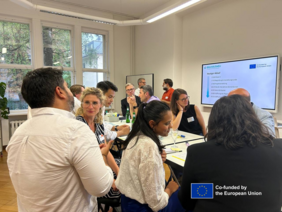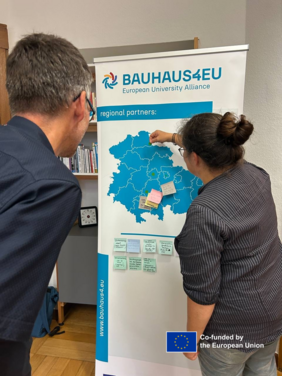BAUHAUS4EU: First Meeting of the Thuringian Regional Council
On 4 September, the BAUHAUS4EU University Alliance invited its partners from across Thuringia to a workshop at the Startup Hub »neudeli«. The Thuringian »B4EU-Regional Council« kicked off its work with the constituent meeting. The goal is to strengthen the relationship between the Bauhaus-Universität Weimar and regional partners and to initiate collaborative projects. In addition to representatives from the Faculties of Architecture & Urbanism, Civil & Environmental Engineering, and Media, University President Prof. Peter Benz was also in attendance.
The approval of the EU-funded BAUHAUS4EU project signifies not only an important step towards internationalisation at the University, but also a major opportunity for the Thuringian region. Guests from the fields of politics, culture, environmental protection, (further) education, and business engaged in stimulating discussions on how to make the potential of regional innovation more visible and how to get students excited about these topics. The initial ideas for courses, regional labs, and research collaborations were compiled on a map of Thuringia. The map makes clear the importance of this exchange for the development of innovative and practical teaching formats within the Alliance and at the Bauhaus-Universität Weimar.
Dr. Tonia Schmitz, B4EU Alliance Project Coordinator (Secretary General), emphasised the importance of proper expectation management between science and practice; this is necessary for the implementation of formats such as international short-term programmes or regional labs: »Despite the fact that processes at universities tend to take longer and we cannot react as quickly as the private sector, we offer immense creative potential and can act as a catalyst. If our partners support these initiatives, joint activities such as international short-term programmes (e.g. spring schools) and regional labs can be implemented and add significant value to the region.«
Prof. Dr. Uwe Plank-Wiedenbeck, Professorship of Transport System Planning, presented one example of successful cooperation: Together with the Landesentwicklungsgesellschaft Thüringen (a B4EU Alliance partner) and the Thüringer Ministerium für Digitales und Infrastruktur, he led an English-taught course at the Faculty of Art and Design in which students came up with modular designs for public transport stops. »I was amazed at the ideas that the international team came up with. We clearly notice that students are no longer interested in learning in the abstract — they want to develop real solutions.«
The Regional Council meetings are scheduled to take place regularly in the future so that ideas can be translated into concrete teaching and research formats such as regional labs, European Bauhaus.Modules, and practical courses on entrepreneurial thinking.
The regional partners include:
University of Music FRANZ LISZT
Stiftung Baukultur Thüringen
Klassik Stiftung
Naturstiftung David
EDIH (European Digital Innovation Hub Thüringen)
Thüringer Staatskanzlei
Tourismusregion Rennsteig-Schwarzatal e.V.
Bauhaus Further Education Academy e.V.
What Are Regional Councils?
Each of the ten BAUHAUS4EU regional has its own Regional Council made up of partners from the fields of politics, society, and culture. A total of 67 affiliated partners contribute to the BAUHAUS4EU University Alliance with their insights into the needs and potential of their field of expertise. The Regional Councils offer advice to the universities and support strategy development within the Alliance, especially when it comes to measures whose impact extends beyond the university. They also contribute to ongoing, innovative course development by carrying out specific tasks.
About BAUHAUS4EU
The BAUHAUS4EU Alliance is made up of 10 universities and 67 affiliated partners across Europe. Together, they form a shared European campus and provide 124,000 students and 10,000 staff with a vibrant learning community. Driven by a common strategy, the partner universities are committed to strengthening their transnational cooperation through collaborative educational projects and promoting a European identity founded on the principle of unity in diversity.
By improving career opportunities, promoting lifelong learning, and empowering students and staff to engage with current critical issues, BAUHAUS4EU is pioneering a new model of European higher education – one that strengthens regional ecosystems, encourages innovation, and creates a sustainable future for everyone.
BAUHAUS4EU is funded by the European Union.


